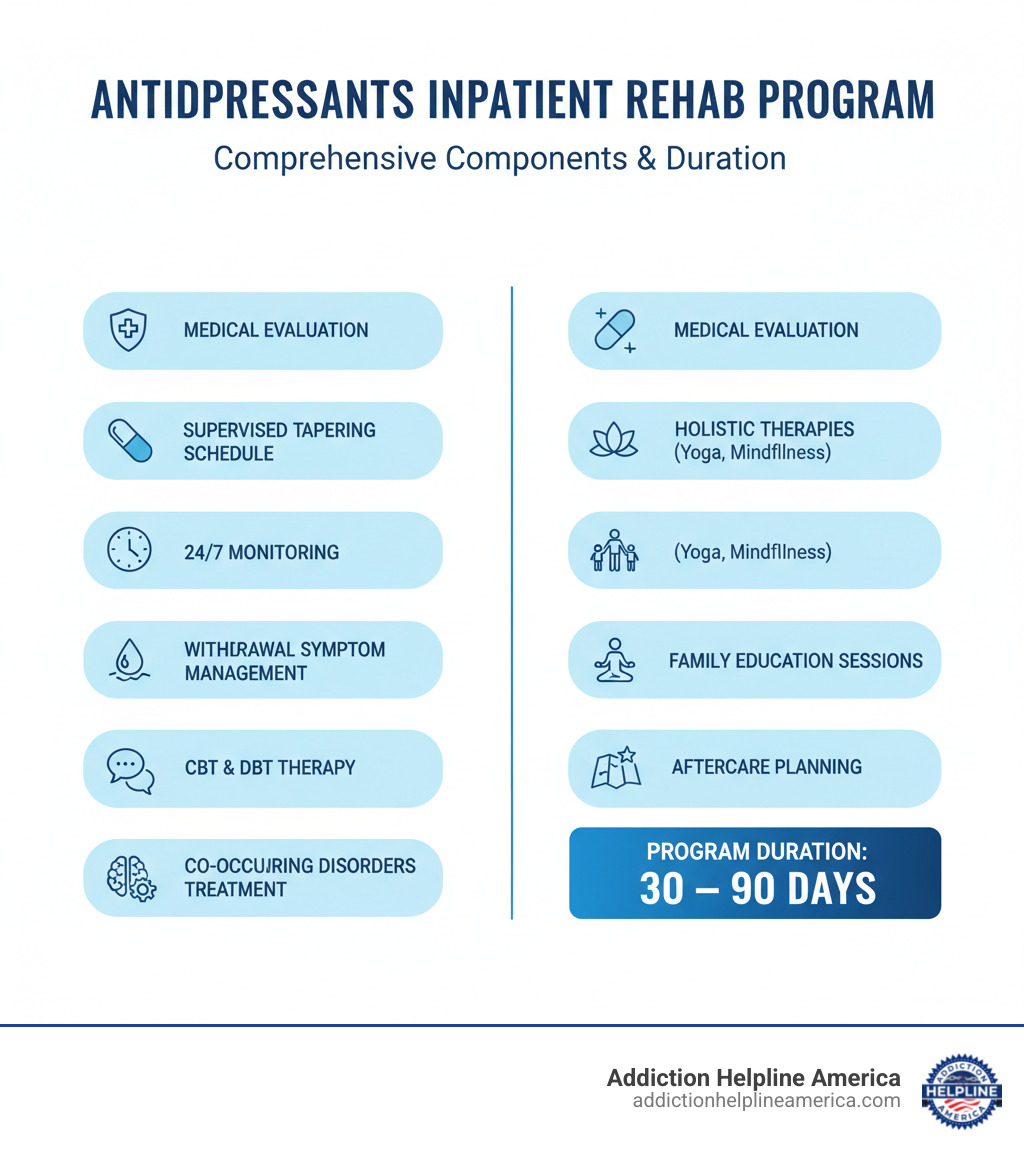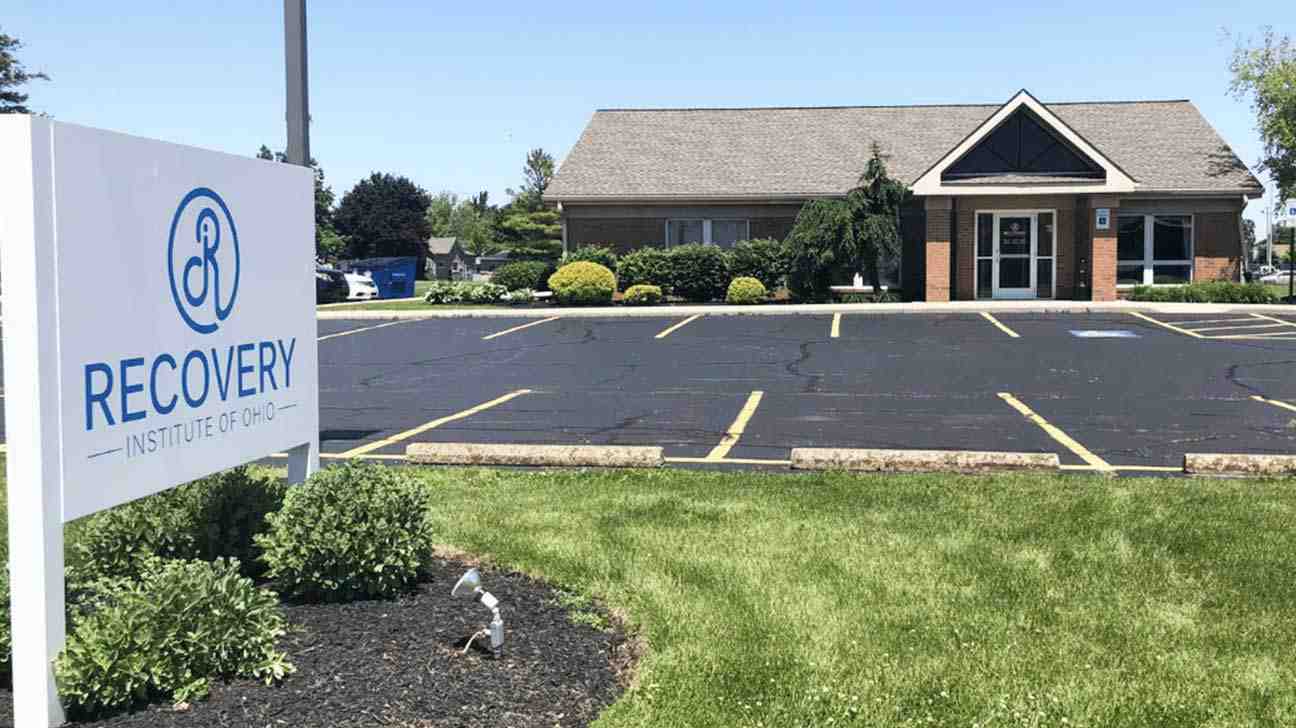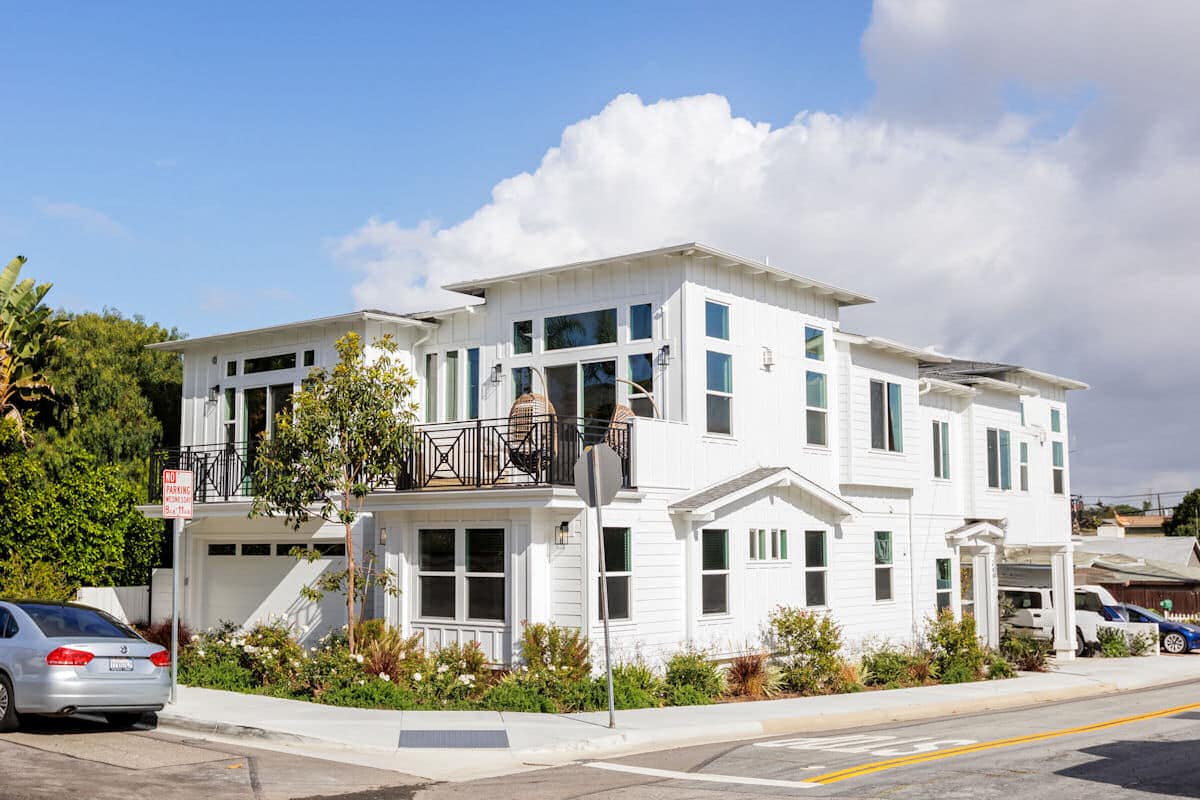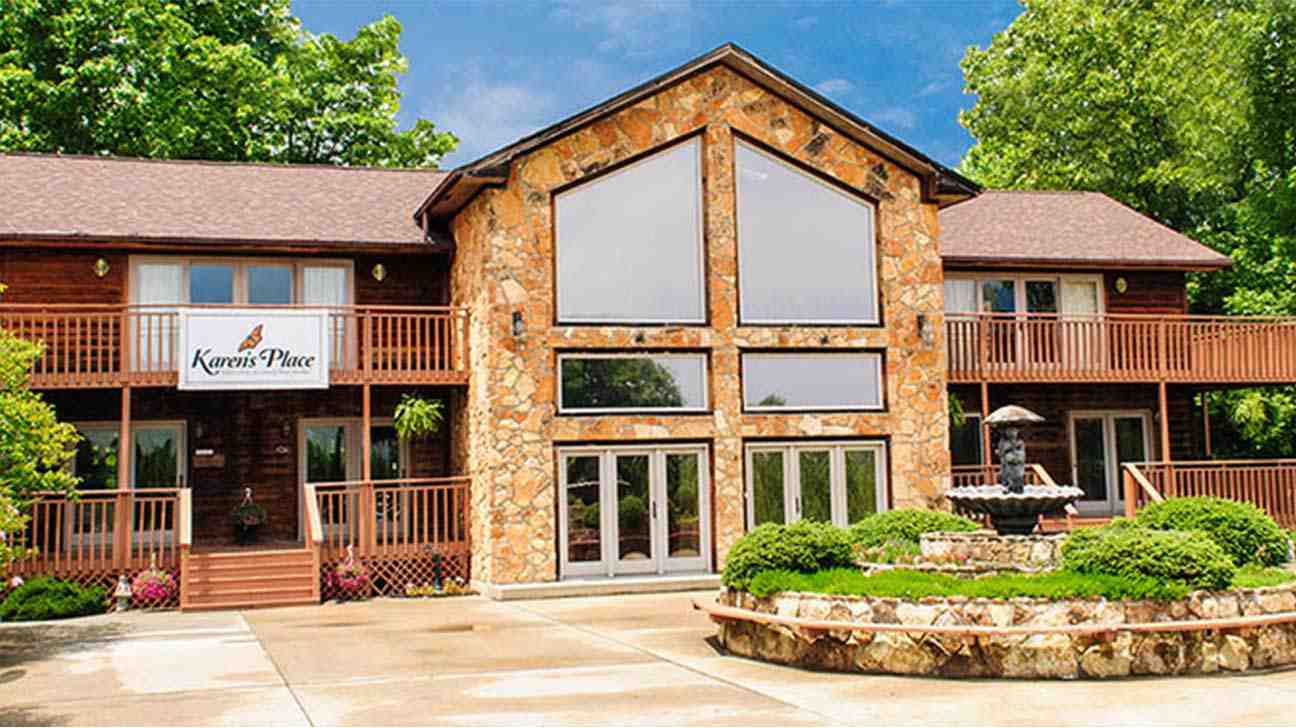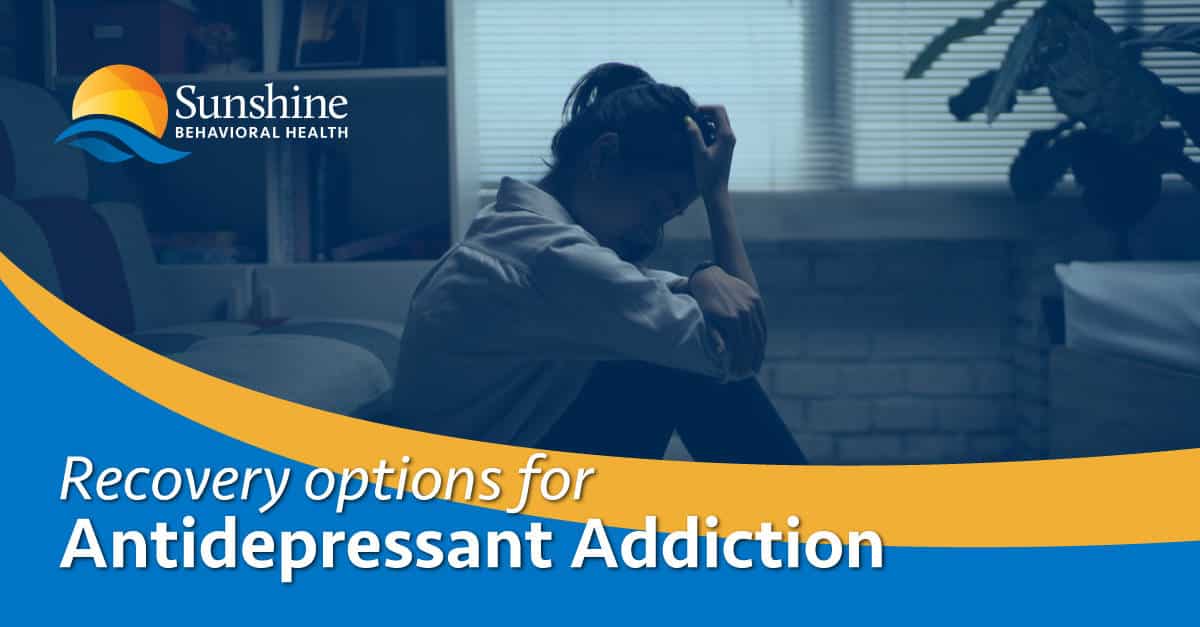
Why Specialized Inpatient Care Makes All the Difference
An antidepressants inpatient rehab program offers medically supervised support for individuals needing to safely discontinue antidepressants or requiring intensive treatment for severe depression. These programs are crucial for those experiencing severe withdrawal, treatment-resistant depression (TRD), or co-occurring mental health conditions that make outpatient care unsafe.
Key benefits include 24/7 medical monitoring to manage withdrawal symptoms like ‘brain zaps’ and rebound depression, a gradual, supervised tapering schedule, and an integrated therapeutic approach in a trigger-free environment. Detoxing from antidepressants at home is risky, with a high likelihood of withdrawal symptoms and relapse. At Addiction Helpline America, we connect you with specialized programs that provide compassionate, evidence-based care, making recovery not just possible, but sustainable.
Quick antidepressants inpatient rehab program terms:
Understanding the Need for Inpatient Antidepressant Care
Deciding to stop antidepressants can be daunting. While these medications help millions, discontinuing them isn’t always simple. An antidepressants inpatient rehab program provides the medical oversight and emotional support that home-based tapering lacks. Most people experience some form of withdrawal, known as Antidepressant Discontinuation Syndrome (ADS). This is a physical dependence—your body adapting to the medication—not an addiction, which involves compulsive drug-seeking. However, attempting to detox at home can be dangerous, increasing the risk of relapse, severe mood swings, and life-threatening disturbances. An inpatient program offers a structured, medically supervised environment, which is a smart, safe choice for your well-being.
Who is an Inpatient Program For?
An inpatient program is particularly beneficial for those on antidepressants long-term, individuals who have had unsuccessful tapering attempts, or those with co-occurring conditions like anxiety, PTSD, or substance use issues. It is also a critical resource for people with Treatment-Resistant Depression (TRD), offering comprehensive evaluations and advanced treatment options beyond standard medication trials.
Key Signs You Might Need Inpatient Support
Key signs that you might need inpatient support include worsening depression when tapering, severe withdrawal symptoms (dizziness, nausea, ‘brain zaps’), an inability to manage daily life, or suicidal thoughts. A non-supportive home environment or multiple failed outpatient attempts are also strong indicators.
The Critical Difference: Inpatient Rehab vs. Traditional Drug Rehab
It’s crucial to know that an antidepressants inpatient rehab program differs from traditional drug rehab. Its focus is on mental health stabilization, not addiction. The process involves a customized, gradual medication taper based on the drug’s half-life, alongside therapy to address the underlying depression and build coping skills for long-term wellness. For a deeper look at how inpatient care can support your mental health journey, check out our guide on in-patient rehab for depression or learn more about residential treatment.
The 10 Essential Components of a Top Antidepressants Inpatient Rehab Program
Choosing the right antidepressants inpatient rehab program is a critical step. An effective program is more than a place to stay while tapering off medication; it’s a comprehensive support system for your physical, emotional, and psychological well-being. The best programs combine medical expertise with compassionate care, creating an environment where healing is the primary goal.
We’ve identified ten essential components that define a top-tier program. This guide will help you understand what quality care looks like, so you can make an informed decision for your recovery journey. At Addiction Helpline America, we’ve helped thousands find the right fit. Let’s walk through the essential components that define a top-tier antidepressants inpatient rehab program. For more information, visit our page on comprehensive mental health treatment.
1. Comprehensive and Individualized Evaluation
A quality antidepressants inpatient rehab program begins with a comprehensive evaluation to create a complete picture of your situation. This isn’t a rushed process. It includes a thorough psychiatric assessment of your mental health history, a medical history review to identify any physical conditions affecting treatment, and a substance use screening. For those with Treatment-Resistant Depression (TRD), specialized neuropsychological testing can offer new insights. The evaluation also identifies co-occurring disorders like anxiety or PTSD. All this information is used to create a personalized treatment plan—a roadmap designed specifically for you, which is the hallmark of an effective program. To learn more about how comprehensive mental health treatment can benefit you, visit our resource on comprehensive mental health treatment.
2. Medically Supervised Detoxification and Tapering
A primary reason to choose an antidepressants inpatient rehab program is for safe, medically supervised discontinuation of medication. This process includes 24/7 medical monitoring, where staff track your vitals and respond immediately to any concerns. The core of this is a gradual medication tapering schedule, customized to your specific antidepressant and its half-life—how long it takes to leave your system. For example, a short half-life drug like Effexor requires a different tapering plan than a long half-life drug like Prozac. Throughout the detox, the team focuses on minimizing your discomfort and ensuring your safety, preventing dangerous complications that can occur when stopping medication without professional support. If you’re considering a more intensive approach, you might explore our information on 7-day inpatient detox.
3. Specialized Management of Withdrawal Symptoms
A top antidepressants inpatient rehab program excels at managing the specific symptoms of Antidepressant Discontinuation Syndrome (ADS).
This includes unsettling symptoms like ‘brain zaps’ (electric shock sensations), which are managed through careful medication adjustments. Staff are trained to distinguish between rebound depression and anxiety and a return of your underlying condition, adjusting treatment accordingly. Physical discomforts like nausea, flu-like symptoms, and insomnia are managed with supportive care and medication to promote rest and healing. The central focus is on mood stabilization through therapy and non-antidepressant medications when needed. The typical detox timeline involves symptoms starting in the first few days, peaking around week one, and gradually subsiding over the next several weeks, though some may experience protracted withdrawal requiring ongoing support.
4. A Multi-Faceted Therapeutic Approach
The core of an antidepressants inpatient rehab program is therapy that addresses the root causes of depression. Cognitive Behavioral Therapy (CBT) helps you identify and challenge negative thought patterns, while Dialectical Behavior Therapy (DBT) teaches skills for emotional regulation and distress tolerance. Individual counseling provides a confidential space to process personal history and develop coping strategies. In group therapy, you connect with peers who understand your struggles, reducing isolation and building a sense of community.
A key goal is addressing psychological dependency—the fear of living without medication. Therapy builds your confidence and equips you with a toolkit of healthy, sustainable coping skills to manage stress and emotions, fostering resilience for the long term.
5. Integrated Treatment for Co-Occurring Conditions
Depression rarely exists in a vacuum, which is why integrated treatment for co-occurring conditions is essential in an antidepressants inpatient rehab program. Quality programs have dual diagnosis expertise, with staff trained to understand how conditions like anxiety, PTSD, and substance use interact with depression. They treat anxiety and depression simultaneously and provide trauma-informed care to address underlying issues that may fuel depression. If substance use is a factor, integrated substance use disorder treatment is provided under one roof. This is all achieved through coordinated care from a multidisciplinary team—psychiatrists, therapists, and medical staff all working together from the same playbook to ensure your complete recovery. For more information, explore our resources on treatment for depression and anxiety, inpatient substance abuse and mental health treatment, and mental health help.
6. Advanced Options for Treatment-Resistant Depression (TRD)
For those with Treatment-Resistant Depression (TRD)—depression that hasn’t responded to at least two different antidepressants—a specialized antidepressants inpatient rehab program offers hope. These programs provide advanced approaches beyond standard outpatient care. Medication management for TRD is conducted under close monitoring, allowing for optimization, augmentation, or the introduction of newer medications. Some programs offer advanced interventions like Transcranial Magnetic Stimulation (TMS) or Esketamine, which have shown promise for TRD. For more information on these and other treatments, the National Institute of Mental Health (NIMH) is an excellent resource. Genetic testing can also help personalize medication choices. This is combined with intensive, focused therapy to address the entrenched patterns of TRD, offering a comprehensive path to relief when other methods have failed. We can help you find help for mental health that addresses even the most complex situations.
7. A Safe, Structured, and Supportive Environment
An antidepressants inpatient rehab program provides a sanctuary designed for healing. By removing you from daily triggers and stressors, it creates a trigger-free setting where you can focus entirely on recovery. The environment fosters a powerful sense of community through peer support, connecting you with others who share similar struggles and reducing the isolation of depression. A structured daily routine provides accountability and predictability, which is grounding during a volatile time. Most importantly, you have 24-hour emotional and medical support, a safety net that allows you to be vulnerable and do the hard work of healing. This immersive, supportive environment is a key component of successful treatment that cannot be replicated at home. To learn more about supportive inpatient environments, visit our page on inpatient rehab.
8. Incorporation of Holistic and Lifestyle Therapies
A holistic antidepressants inpatient rehab program nurtures the whole person—mind, body, and spirit. These therapies work alongside medical and psychological treatment to build a foundation for long-term wellness. Mindfulness and meditation teach you to stay grounded, while yoga and movement therapy help reconnect mind and body. Nutritional counseling provides guidance on how food choices can support stable moods. Creative outlets like art and music therapy offer non-verbal ways to process emotions. Since sleep is often disrupted, sleep hygiene education provides practical strategies for better rest. Finally, custom exercise programs leverage physical activity’s natural antidepressant effects.
These holistic tools become part of your personal toolkit for managing stress and emotions without medication, building a foundation for long-term wellness.
9. Family Therapy and Education
Depression and recovery affect the entire family. A comprehensive antidepressants inpatient rehab program includes family therapy and education to heal relationships and build a strong foundation for aftercare. The program focuses on educating loved ones about depression and the recovery process, turning their concern into effective support. Family therapy sessions and communication workshops help heal strained dynamics, rebuild trust, and teach healthier ways of interacting. Involving family is crucial for building a strong support system for aftercare. When the family heals together, the person in treatment feels less isolated, and everyone benefits from improved communication and stronger relationships, significantly increasing the chances of lasting recovery. For more information, visit our page on inpatient substance abuse and mental health treatment.
10. Robust Aftercare and Relapse Prevention Planning
Completing an antidepressants inpatient rehab program is the start of a new chapter, not the end of the journey. Effective programs prioritize robust aftercare and relapse prevention. This begins with a personalized continuing care plan—a roadmap for ongoing support, including therapy, medication management, and lifestyle strategies. The program will help you connect with an outpatient therapist before you leave, ensuring a smooth transition and continuity of care. You’ll also receive recommendations for peer support groups like SMART Recovery or depression-specific groups, as well as access to alumni networks for ongoing connection. The goal is to equip you with long-term wellness strategies and a concrete plan for preventing relapse. This includes recognizing your personal warning signs and knowing exactly what steps to take, ensuring temporary setbacks don’t become full relapses.
Frequently Asked Questions about Antidepressant Rehab
We understand that considering an antidepressants inpatient rehab program comes with many questions. Here are concise answers to some common concerns.
How long does an antidepressants inpatient rehab program typically last?
The length of stay is personalized and can range from 30 to 90 days. Shorter stays of 14-30 days may be sufficient for initial stabilization, but longer programs allow for a more thorough, gradual taper and intensive therapy. The ideal duration depends on your specific needs, the severity of your symptoms, and any co-occurring conditions.
What is the detox timeline for antidepressants?
The timeline varies by medication, dosage, and individual physiology. Generally, symptoms start within 1-3 days, peak around the first week, and then gradually subside over several weeks to months. While most symptoms resolve within 4-6 weeks, some individuals may experience milder, protracted withdrawal. A medically supervised program manages these symptoms safely throughout the entire process.
How does inpatient rehab help with psychological dependency on antidepressants?
Inpatient rehab addresses the fear of living without medication through several strategies. Therapy (CBT, DBT) builds confidence and challenges fearful thoughts. You learn practical coping skills to manage emotions without medication. The program helps you create a relapse prevention plan, which reduces anxiety about the future. By understanding the root causes of your depression and connecting with peers in group therapy, you build self-reliance and realize you are not alone, which is key to overcoming psychological dependency. For more information, visit our page on mental health help.
Find the Right Path to a Life Beyond Antidepressants
Taking the first step toward a life beyond antidepressants—or finding new ways to manage treatment-resistant depression—takes courage. Recovery is not just possible; it’s within your reach. An antidepressants inpatient rehab program offers a unique combination of medical expertise, deep therapeutic work, and a supportive environment designed for healing. It’s a safe space to transition off medication, address underlying challenges, and build skills for lasting well-being.
At Addiction Helpline America, our mission is to provide free, confidential, and personalized guidance. We connect you with the right program from our trusted network of treatment centers across the nation. We listen to your unique needs and help you find a program that truly fits. Don’t let uncertainty hold you back. Reach out today, and let us help you explore the types of treatment programs for you that can start you on your journey to lasting well-being and hope.
Our helpline is 100%
free & confidential
If you or someone you care about is struggling with drug or alcohol addiction, we can help you explore your recovery options. Don’t face this challenge alone—seek support from us.
Programs
Resources
Will my insurance
cover addiction
treatment?
We're ready to help
Find the best
drug or alcohol treatment
center
Are you or a loved one struggling with addiction? Call today to speak to a treatment expert.

